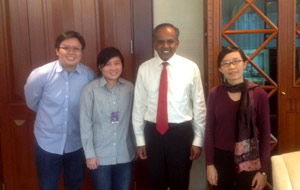The following statement was published on http://sayoni.com on Dec 29, 2011:

From left: Jean Chong, Irene, Law Minister K Shanmugam and Kelly.
It all started on the 6th of October 2012 when, out of sheer frustration about the state of institutionalised discrimination against lesbian, gay, bisexual and transgender (LGBT) persons in Singapore, I left a note on the Facebook Page of the Minister for Law and Foreign Affairs, K Shanmugam.
I wrote of friends leaving and the National Conversation making no effort to remember that we are Singaporeans too. I highlighted our trip to the United Nations last year to present our shadow report detailing the kind of discrimination that the government so often denies. As I wrote, I got a little bolder and said that if LGBT citizens are not wanted, please tell us, so that we can all forget this struggle and move on to wherever we need to be.
Minister Shanmugam kindly replied, “There can be no suggestion that LGBT citizens are not wanted.” The bigger question is, with the diverse viewpoints in our society and often held strongly by various groups, the government is often caught in the middle trying to decide what would be acceptable to the majority.
I replied by speaking about retaining laws like 377A, which in turn informs or influences policies, creating a cascading effect felt deeply by every LGBT person in Singapore. The exchange went on a few more times and Minister Shanmugam suggested that we meet for a proper chat for him to hear us more on the issues.
On the 27th of November, Kelly, Irene and I met Minister Shanmugam. We shook hands and introduced ourselves. He is a soft-spoken man with eyes reflecting his intelligence and who listened closely to what was said to him. For privacy, selected parts of the conversation are reported here.
Minister Shanmugam started out by describing what he saw of the diversity of views in our society and how different segments of the population see the LGBT community. This is an issue of personal conduct and different people will have their own take on such conduct. It is not easy for the government to tell citizens what viewpoint to take – many people will have strongly held views based on religious and other beliefs. He went on to say that the debate won’t stop at the repeal of 377A. Debates on same-sex marriage and other issues would follow. All the culture wars which are being fought in the USA might be brought to Singapore. The government has been saying we should leave things be by letting people carry on with their lives and be tolerant. Even though 377A is kept on the books, charges have not been proactively brought on 377A.
Irene asked why a government that has made unpopular decisions when it felt the need to stays ambivalent on this subject.
The Minister replied that the government cares deeply about citizens’ viewpoints and that public opinion does matter very much. Precisely because of its focus on what people need and feel, the government has been successful. He went on to say that the state cannot govern without the consent of the people.
We described to the Minister experiences in the lifespan of an LGBT person and obstacles we faced from young to old age. The Minister paid close attention when we outlined the kinds of discrimination we face in a wide spectrum of areas, from employment, education, housing and social benefits to violence. We linked the cascading effects of laws and censorship that justifies the discriminatory policies and how they translate to simple day-to-day living circumstances.
Minister Shanmugam listened intently to what we explained and said that for there to be change, there has to be a majority’s social acceptance, which we agreed that we are working on. However, we countered that it is difficult with censorship looming over our media, banning neutral or positive portrayals of LGBT persons.
We noted that the LGBT community would prefer not to have an adversarial relationship with the government. If there are no concrete actions taken on these issues, it is very difficult for us with or without our children to justifying staying in Singapore. The practicality of life demands a solution.
When our time was up, we thanked him for hearing us out. The meeting was a good opportunity to establish mutual understanding. He offered to meet again, with a larger group of us.
Jean Chong is a co-founder of Sayoni, a non-profit organisation based in Singapore for lesbian, bisexual and transsexual Asian women.
